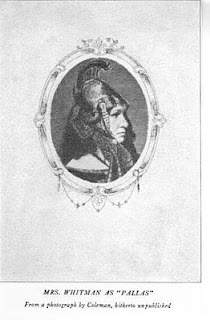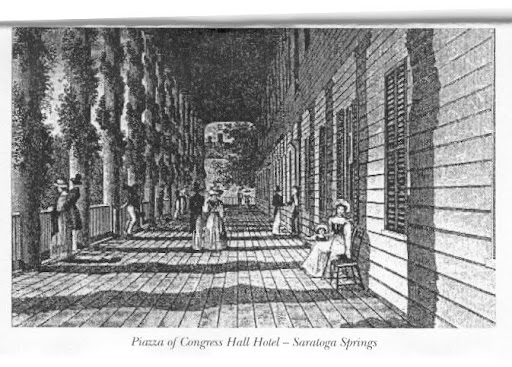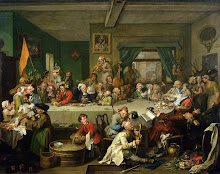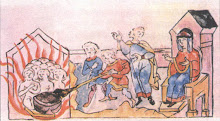
Those six words are among the most intriguing--and hotly-contested--utterances ever attributed to Edgar Allan Poe.
The controversy started--as so many did--with Rufus Griswold's biography of Poe ("that very peculiar fancy-piece called a 'Memoir,'" in the immortal words of GeorgeW. Eveleth.) In describing the end of his subject's engagement to Sarah Helen Whitman, Griswold wrote:
"They were not married, and the breaking of the engagement affords a striking illustration of his character. He said to an acquaintance in New York, who congratulated with him upon the prospect of his union with a person of so much genius and so many virtues--'It is a mistake: I am not going to be married.' 'Why, Mr. Poe, I understand that the banns have been published.' 'I cannot help what you have heard, my dear Madam: but mark me, I shall not marry her.' He left town the same evening, and the next day was reeling through the streets of the city which was the lady's home, and in the evening--that should have been the evening before the bridal--in his drunkenness he committed at her house such outrages as made necessary a summons of the police. Here was no insanity leading to indulgence: he went from New York with a determination thus to induce an ending of the engagement; and he succeeded."
When Griswold's anecdote appeared in print, Mrs. Whitman was, unsurprisingly, quite aggrieved. Her concern, however, was far more for her own reputation than it was for Poe's. After all, she herself told a correspondent soon after Poe's death that "I could not have written to you so freely...if the interest I feel in Mr. Poe had partaken of the character of what is usually termed
love." Also, in years to come, she did not hesitate to relate to his biographers many damning stories of her own, such as a long, surreal anecdote--which she claimed was the basis for Griswold's distressing tale--describing a time when Poe came to her house in a state of madness so hysterical that a doctor had to be summoned. (She claimed piously that it was only this graphic evidence of his desperate state that caused her to accept his proposal, in the hope of "saving" him.) The truth was, her vanity was pricked by this public statement that Poe had rejected her--and worse, that he had not hesitated to let all his acquaintances know it.
In the hope of finding evidence to contradict Griswold's assertion, Whitman wrote to a minor poet named Mary Hewitt. She and Hewitt did not know each other, but Whitman was aware that the other woman was a friend of Griswold's, and she hoped to learn how he acquired the story. (From her letter to Hewitt, she clearly assumed the source was another "literary lady," Jane Locke--who had repeatedly informed her that Poe had told many people he had no intention of ever marrying Whitman.)
On receiving Hewitt's reply, Whitman was disconcerted to find that not only did Hewitt endorse the basic truth of Griswold's story--that Poe denied that he would marry Whitman--but that she herself claimed to be the "acquaintance in New York" to whom Poe made his declaration! (Incidentally, it seems just too coincidental that Whitman, completely by accident, contacted--of all the people in New York--the very person who figured in Griswold's anecdote. It is possible that Hewitt, who had after all barely known Poe, simply lied about being the recipient of his declaration, in order to be able to defend and corroborate her good friend Reverend Rufus to Whitman. Lacking more evidence in the matter, this can only remain speculation.)
Unfortunately, Whitman did not keep Hewitt's actual letter to her detailing this important conversation. Whitman had an irritating--and most suspicious--habit of mutilating, destroying, and altering her correspondence with others about Poe, evidently with the aim of creating a historical record to benefit herself. As part of this selfish ambition, she preserved "draft" copies of letters she supposedly wrote giving information about her
putative ex-fiance (we usually have no idea if they matched what she actually sent her correspondents.) Even worse, she made copies of important letters she received, then destroyed the originals, leaving posterity in the dark about whether these copies precisely matched the real letters.
Whitman left what she said were
two "extracts" from Hewitt's letter to her--and they do not match. One, in the Boston Public Library's collection of Griswold's papers, quotes Hewitt writing to Whitman, "As Mr. Poe arose to leave he said 'I am going to Providence this afternoon.' 'I hear you are about to be married,' I replied. He stood with the knob of the parlour door in his hand, and as I said this drew himself up with a look of great reserve and replied 'that marriage will never take place.' 'But,' I persisted, 'it is said you are already published.' Still standing like a statue with a most rigid face, he repeated 'It will never take place.' These were his words and
this was all. He bade me good morning on the instant and I never saw him more." (In this "extract," Whitman also included a passage that reflected her willingness to pass on slurs against Poe when it happened to suit her purposes. She quotes Hewitt as defending Griswold's motives in publishing his story, with the words, "I am assured dear Mrs. Whitman that for yourself Mr. Griswold cherishes the highest respect and admiration. I know he regretted your intended marriage, knowing upon what a wreck (pray forgive me) you were about to embark so trustingly.")
The other copy of this letter, among Whitman's papers in the Lilly Library, omits reference to the banns, with Mrs. Hewitt merely asking, "Mr. Poe, are you going to Providence to be married?" Poe is depicted as replying "No, Madam, I am not going to Providence to be married, I am going to deliver a lecture on Poetry." After a pause, he added, "That marriage may never take place."
Quite a difference!
Just to add further confusion to an already unreal story, in 1852 Whitman, distressed that the claim she had been jilted refused to die, deputized her friend William Pabodie to write Griswold on her behalf. (She evidently lacked the nerve to confront him herself.) Pabodie loyally denied that Whitman had been rejected by the late poet. He claimed--citing Hewitt's letter as his source--that Poe had stated that "the marriage
may never take place," these words being merely a reference to the objection of her family and friends to the match.
Griswold responded with one of his more psychotic letters. After asserting the truth of Poe's desire to be rid of Mrs. Whitman, he resorted to out-and-out menace, threatening to defend himself by placing "before the public such documents as will be infinitely painful to Mrs. Whitman and all others concerned." (These "documents"--presumably letters to or from Poe giving his true feelings regarding Whitman--have not survived, if they ever existed.) Griswold added that he had "great respect and sympathy" for Mrs. Whitman, but on the subject of Poe "if not on some others" she "was insane." (A statement that was true enough, but surely a "pot, meet kettle" moment if ever there was one.) He followed this with the utterly baffling declaration that at the time of Poe's conversation with Mrs. Hewitt, he "was already engaged to another party." Just to round things out nicely, he closed by declaring that at the time of Poe's death, he was keeping both Mrs. Clemm and "Annie" Richmond as his mistresses, while preparing to marry Mrs. Shelton for her money.
After this cornucopia of slime was delivered (Poe biographer Arthur Quinn shuddered to think of what Griswold must have been privately
whispering about Poe, if he was willing to put the likes of this on paper,) the dispute, unsurprisingly, lapsed. While the side issue of whether Poe made his last appearance in Providence a scene of drunken riot was firmly denied by both Whitman and Pabodie, the vital question of Poe's true intentions and feelings regarding his "Helen" foundered in utter confusion. For the rest of her days, Whitman strongly denied that Poe had behaved as constabulary bait during his final visit to her home--a denial she clearly hoped would, by inference, cast doubt on the rest of Griswold's story--but she avoided directly dealing with his alleged chat with Mrs. Hewitt.
Where does all this leave us? Where we usually wind up in Poe biography: Dealing with a welter of utterly irreconcilable stories emanating from unsatisfactory and untrustworthy sources. Both Mary Hewitt and Jane Locke apparently stated that Poe had--not just to themselves, but to others as well--denied that he was engaged to Whitman. Unfortunately, we have nothing directly from these women themselves, and Locke, at least--who suffered from a frustrated passion for Poe--was deranged enough to say anything to anyone. (After Poe's death, Locke outraged Maria Clemm by stating he had sent her a "farewell message" via Mrs. Whitman. She also spread talk that Whitman herself had had some hard things to say about the late poet.)
Whitman herself clearly believed in her heart Poe
had repudiated the gossip claiming they were engaged, although she professed to be befuddled why he would make such a statement. According to her, Poe spent virtually every moment of their acquaintance begging for her immediate hand. However, Whitman's willingness to tamper and distort direct evidence (such as Hewitt's letter,) her obvious self-interest in preserving the legend of Poe's passion for her, and her generally varying and contradictory stories about anything concerning her relationship with the poet leaves it impossible to implicitly trust the woman. The evidence makes it probable that Poe did indeed state--loudly enough for it to become common knowledge, even before the publication of Griswold's memoir--that he would not marry Whitman. This, of course, changes the entire accepted history of their association, leaving it shrouded in mystery and doubt.
Once again, we are left asking: Who
was Edgar Poe? And what relationship did he have to the legendary figure bearing that name which was created by his contemporaries--Griswold, Whitman, and all the rest--after the flesh-and-blood man was no longer around to speak for himself?
 January 3, 1846 marked the final issue of the "Broadway Journal," a small literary weekly that had been alive for only a year. The magazine carried a farewell message from its owner/editor, Edgar Allan Poe:
January 3, 1846 marked the final issue of the "Broadway Journal," a small literary weekly that had been alive for only a year. The magazine carried a farewell message from its owner/editor, Edgar Allan Poe:




















